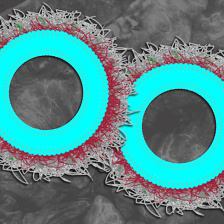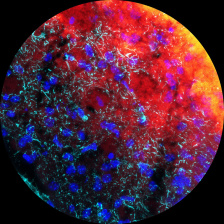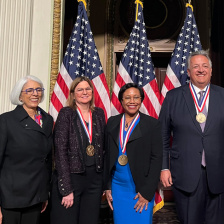
Photo: Gretchen Ertl Photography
Contact Information
Administrative Support
Koch Institute
MIT Provost Office
Naglaa Elshamy
617-258-6503
Research Areas
Nano-based drugs, Immunology & immunotherapy
Working with clinicians, biologists, and fellow engineers keeps me motivated to bring engineering and materials design tools to work on delivering cancer therapies in a manner that leads meaningful treatments.
Research Summary
The Hammond Laboratory uses electrostatics and self-assembly of polymers to create drug delivery systems that convey high degrees of spatial and temporal control and target cells of interest via multiple modes. They develop nanoparticles capable of delivering combination therapies that include siRNA, proteins, and small molecule drugs for ovarian cancer, as well as brain and other intractable cancers. Additional cancer applications include vaccine generation and delivery of immunostimulatory agents to the tumor microenvironment.
The group’s signature layer-by-layer (LbL) nanoparticle delivery platform possesses great translational potential and several desirable features, including nanoscale size, combinatory therapeutics with high loading capacity, staged cargo release, enhanced stability in vivo, and tunable surfaces for targeting tumor or immune cells¬. These nanoparticles can incorporate therapeutics such as RNA, proteins, or small molecule drugs in nanolayers wrapping a charged colloidal core containing a chemotherapy such as doxorubicin or cisplatin. Further, the LbL platform can introduce different polymeric surface chemistries to target tumor tissues’ slight acidity, and present specific ligands that bind to known receptors highly expressed on the surfaces of several aggressive tumor cell types.
Hammond uses these same polymeric materials for drug releasing biomedical implants, growth factor and siRNA release for wound healing, bone regeneration, and vaccines.
Biography
Professor Hammond is an Institute Professor and the Executive Vice Provost at the Massachusetts Institute of Technology. She is a member of MIT’s Koch Institute for Integrative Cancer Research, the MIT Energy Initiative, and the MIT Institute for Soldier Nanotechnology. She received her BS in Chemical Engineering from MIT, an MS in Chemical Engineering at Georgia Tech, PhD from MIT. She held the Ford Foundation Dissertation Fellowship, and on completing her PhD, was an NSF Postdoctoral Fellow at the Harvard University Chemistry Department before returning to MIT as a faculty member.
In 2024, she received the National Medal of Technology and Innovation and the Benjamin Franklin Medal in Chemistry. She has received the 2023-2024 MIT Killian Faculty Achievement Award. In 2019, she received the American Institute of Chemical Engineers (AIChE) Margaret H. Rousseau Pioneer Award for Lifetime Achievement by a Woman Chemical Engineer and gave the Materials Research Society (MRS) David Turnbull Lectureship. She is one of only 25 scientists who have been elected to all three National Academies: the National Academy of Science in 2019, the National Academy of Engineering in 2017, and the National Academy of Medicine in 2016. In addition, she is a member of the 2013 Class of the American Academy of Arts and Sciences as well as the National Academy of Inventors. In 2021, Professor Hammond was selected to become a member of the President’s Council of Advisors on Science and Technology (PCAST).
Hammond is a board member and co-founder of LayerBio, Inc., a member of the Scientific Advisory Board of Moderna Therapeutics, Inc., the scientific advisory board of Camden Partners LLC, a member of the Board of Alector, Inc. and member of the boards of Focal Medical and Senda Biosciences. She also serves on non-profit boards, including the Burroughs-Wellcome Fund and the MIT Engine. She is an advising partner in Catalio Nexus Ventures.



